
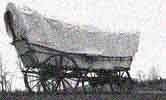
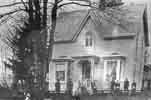
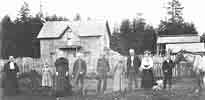
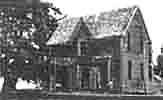
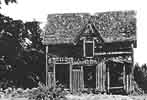
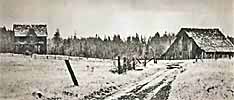
| Home |
| Early Life |
| Maps |
| Oregon Laws |
| The Trail |
| Bush Biography |
| Tumwater Born |
| Thurston County |
| State History |
| Bush
Farm Today |
| FAQs |
| Timeline |
The First Cabin in the First
American Settlement
Reference - History of
the Pacific Northwest
Oregon and Washington 1889
Volume I
Originally Compiled and
Published by the North Pacific History Company of
Portland, Oregon
CHAPTER XXXII (1844-1847)
Page 267
The winter of 1844-5 marks the first attempt of emigrants from the United States to make settlements north of the Columbia river. A portion of the Independent Oregon Company of 1844, of which Cornelius Gilliam was General, Michael T. Simmons, Colonel, stopped at Washougal, where they erected temporary winter quarters and went into camp. Colonel Simmons, and those with his immediate company, had designed to have located in the Rogue river valley; but, on the arrival of Simmons at Vancouver, a persistent effort was made to induce the party to settle south of the Columbia. That effort stimulated Simmons to resolve upon trying the Puget Sound region. He endeavored to secure quarters at Fort Vancouver for his family during his contemplated northern trip. Such request was flatly denied until he should abandon his purpose of settling north of the Columbia. Simmons finally procured from the Kanaka the use of a room for one month in a shanty outside the fort. In the month of December, accompanied by Messrs. Williamson, Loomis and the three brothers Owens, Colonel Simmons started for Puget Sound. After a tedious trip, attended with many hardships, the party reached the forks of Cowlitz river, where their provisions gave out, and they returned to Washougal. In July, 1845, Colonel Simmons visited Puget Sound, accompanied by William Shaw, George Wanch, David Crawford, Ninian Everman, Seyburn Thornton, David Parker and two others. Passing Cowlitz Farms, they learned that John R. Jackson had preceded them, and had located a claim and returned to the Willamette valley for his family. Colonel Simmons' party reached the Sound in August. They procured canoes and went around the head of Whidby's Island, returning through Deception Pass to the east side of the Island.
In the month of October, 1845, Colonel Simmons led the first American immigration to Puget Sound. It consisted of himself and family, Gabriel Jones and family, James McAlister and family, David Kindred and family, George Bush (1) and family, and Messrs. Jesse Ferguson and Samuel B. Crockett. Peter Bercier, of the Cowlitz (French) settlement, acted as a guide from the Cowlitz Prairie. They were fifteen days cutting a road from Cowlitz Landing to Tumwater, or the falls of the Des Chutes river. Colonel Simmons took a claim at Tumwater, calling it New Market. The remainder settled upon Bush Prairie, all within a circuit of six miles. The first house was erected upon the claim of David Kindred, at the edge of the prairie, about two miles south of Tumwater.
(1) George Bush was a colored man, a man of intelligence and great force of character, who deservedly commanded the respect of his associates and neighbors. He had left Missouri because it was a slave State, and there his race was ignored. He migrated to Oregon, north of slavery's line of thirty-six degrees, thirty minutes, which he expected to find "free territory." Before his arrival, the color line had been drawn by the passage of the proscriptive law against his race, inhibiting people of color residing within the territory. North of the Columbia river, where, at that time, British influence controlled, the inforcement of that law was altogether improbable. Besides, it was a prevalent opinion that the Columbia river would be adopted as the boundary line; that north of the river it would possibly continue British soil. Old George, knowing that "slaves cannot breath in England," felt that, for him and his race, north of the Columbia was the preferable location. There is no doubt that George Bush was actuated by such opinions to seek a residence on the north side of the river; nor is it saying too much for the influence he exerted in that little band to claim the sympathy of his associates with his condition, after that long march with them to escape that pro-slavery atmosphere which crushed out his humanity, had much to do in determining the Simmons colony to settle upon Puget Sound.
Here is where Janine M. Bork has put this book on the Internet